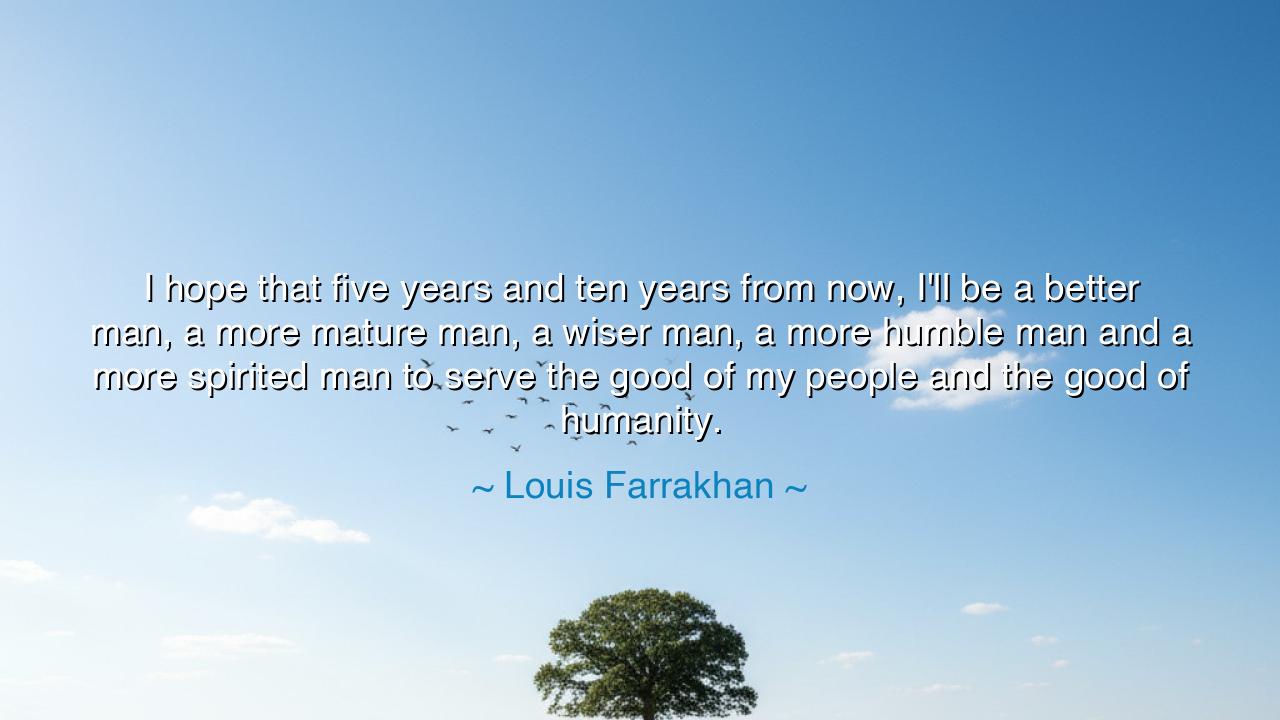
I hope that five years and ten years from now, I'll be a better
I hope that five years and ten years from now, I'll be a better man, a more mature man, a wiser man, a more humble man and a more spirited man to serve the good of my people and the good of humanity.






In the heartfelt and resolute words of Louis Farrakhan, there resounds a call not merely for self-improvement, but for the sacred duty of becoming: “I hope that five years and ten years from now, I’ll be a better man, a more mature man, a wiser man, a more humble man and a more spirited man to serve the good of my people and the good of humanity.” These are not the words of a man content with the present, but of one who sees life as an endless pilgrimage toward virtue. In them speaks the ancient truth that the purpose of life is not mastery, but growth; not conquest, but service. Farrakhan’s declaration is a vow — a promise to himself and to all mankind — that the measure of a man is found not in what he has achieved, but in how he strives to become better for the sake of others.
The origin of this quote lies in the journey of Farrakhan himself, a man who has known both praise and controversy, leadership and criticism. Through it all, his words here reveal a soul turned inward — a man reflecting on the weight of leadership and the need for inner evolution. His statement was not made from pride, but from humility: the recognition that to serve others, one must first discipline oneself. He understood that wisdom is not a crown bestowed by age, but a flame kindled by reflection, repentance, and renewal. In this, Farrakhan joins the lineage of teachers, prophets, and reformers who have all known that the truest power is self-mastery.
To be a better man is the first and most universal calling. Every generation, if it wishes to rise higher than the last, must produce men and women who seek improvement not for glory, but for goodness. Farrakhan’s vision stretches forward in time — he hopes not for instant transformation, but for gradual enlightenment. This patience is itself a lesson: growth is not a moment but a lifetime’s work. The ancient Stoics spoke similarly; Marcus Aurelius, emperor and philosopher, wrote in his meditations, “Waste no more time arguing what a good man should be. Be one.” To live, then, is to become — and to become is to change.
Yet Farrakhan’s hope extends beyond personal virtue. He does not seek to be a better man for his own comfort, but “to serve the good of my people and the good of humanity.” Here lies the essence of noble purpose: self-perfection is meaningless if it does not lead to service. The mature man, the wiser man, the humble man — these are not ends in themselves, but instruments of healing in a wounded world. To be wise is to guide others; to be humble is to uplift them; to be spirited is to inspire them. In his words, we find the harmony of the individual and the collective — the understanding that when one person grows in goodness, all humanity is uplifted.
Consider the story of Nelson Mandela, who, after twenty-seven years in prison, emerged not as a man broken by bitterness but as a man renewed by humility and vision. He had entered captivity as a fighter for justice; he left it as a builder of peace. Mandela did not curse his past; he learned from it. He became wiser, more patient, and more compassionate — precisely the transformation Farrakhan speaks of. The world revered Mandela not because he was perfect, but because he refused to let suffering harden him. His evolution became the hope of a nation, proving that true greatness is not in conquering others, but in conquering oneself for the good of all.
Farrakhan’s words, too, carry that same fire of self-renewal — a call for constant evolution of the spirit. He reminds us that life is not a static state but a flowing river. The one who refuses to grow becomes stagnant, but the one who continues to learn, repent, and rise becomes a fountain of strength to others. To be more humble is to remember that power without humility corrupts. To be more spirited is to keep faith alive even when the world grows dark. These are not traits of convenience, but disciplines of the soul — the quiet, daily labors of becoming a servant of truth and compassion.
Therefore, my children of the living age, take this teaching as your mirror: never cease striving to become better. Each year, let your heart grow softer, your mind sharper, your spirit brighter. Ask yourself daily — am I wiser than I was yesterday? Am I gentler, more just, more courageous in love? Let your strength be tempered with humility, and your knowledge be guided by compassion. For in this continual ascent of the spirit lies the true path of greatness.
And when, at last, the years have passed and you look upon the road behind you, may you find that you, too, have become what Farrakhan hoped to be — a better man, a wiser soul, a humble servant of the good of humanity. For to live in such a way is to leave behind more than words — it is to leave behind light.






AAdministratorAdministrator
Welcome, honored guests. Please leave a comment, we will respond soon